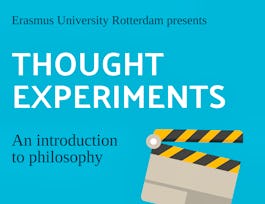We live in a polarised world where all too often people talk past each other. But do you know when to believe what others say? For example, how quick should we be to accept something that someone else tells us is true, and what should we be looking out for when assessing a person's trustworthiness? Meanwhile, what should we do when we encounter disagreements with people who seem to be our equals? How and when should we adjust our beliefs, and how does the appropriate response vary depending on the evidence? These challenges may be especially important in the arena of religious disagreements. How should we weigh the evidence for and against various theistic and atheistic stances?



Intellectual Humility: Practice



Instructors: Dr. Ian Church
Sponsored by ITC-Infotech
14,294 already enrolled
(149 reviews)
Details to know

Add to your LinkedIn profile
19 assignments
See how employees at top companies are mastering in-demand skills


Earn a career certificate
Add this credential to your LinkedIn profile, resume, or CV
Share it on social media and in your performance review

There are 5 modules in this course
What's included
1 video3 readings1 discussion prompt
Professor Peter Graham points out that a great deal of what we know, we know because other people told us. But can we always believe them? Should we be trusting, or sceptical? The truth lies somewhere in the middle. This lecture will offer you some guidelines on how to find it, and on how to avoid the pitfalls created by our fears, biases, and over-confidence.
What's included
8 videos8 readings6 assignments4 discussion prompts
Resolving disagreements may seem easy when one person clearly knows more about the topic of disagreement than the other. But what about cases where both parties are equally knowledgable and capable - in other words, when they are intellectual equals? Professor Catherine Elgin discusses various strategies we can adopt, and helps us understand how people who have the same evidence and reasoning ability can still disagree.
What's included
4 videos7 readings7 assignments4 discussion prompts
Dr Katherine Dormandy explains why religious disagreements are so often particularly hard to resolve. Distinguishing between two types of evidence one can have in religious discussions - public and private - she evaluates three Evidence Weighting Policies we can use in determining how to approach others when talking about religion.
What's included
8 videos5 readings6 assignments4 discussion prompts
What's included
6 readings1 peer review1 discussion prompt
Instructors


Offered by
Why people choose Coursera for their career




Learner reviews
149 reviews
- 5 stars
72.48%
- 4 stars
22.81%
- 3 stars
4.02%
- 2 stars
0.67%
- 1 star
0%
Showing 3 of 149
Reviewed on Jan 20, 2018
well put together but very slow and limited in scope as expected
Reviewed on Dec 27, 2017
Excellent and straightforward. Meaty and digestible.
Reviewed on May 19, 2020
Best taken with Intellectual Humility: Theory and Science
Recommended if you're interested in Arts and Humanities

Yale University
Indian School of Business

Erasmus University Rotterdam

Eindhoven University of Technology

Open new doors with Coursera Plus
Unlimited access to 10,000+ world-class courses, hands-on projects, and job-ready certificate programs - all included in your subscription
Advance your career with an online degree
Earn a degree from world-class universities - 100% online
Join over 3,400 global companies that choose Coursera for Business
Upskill your employees to excel in the digital economy



